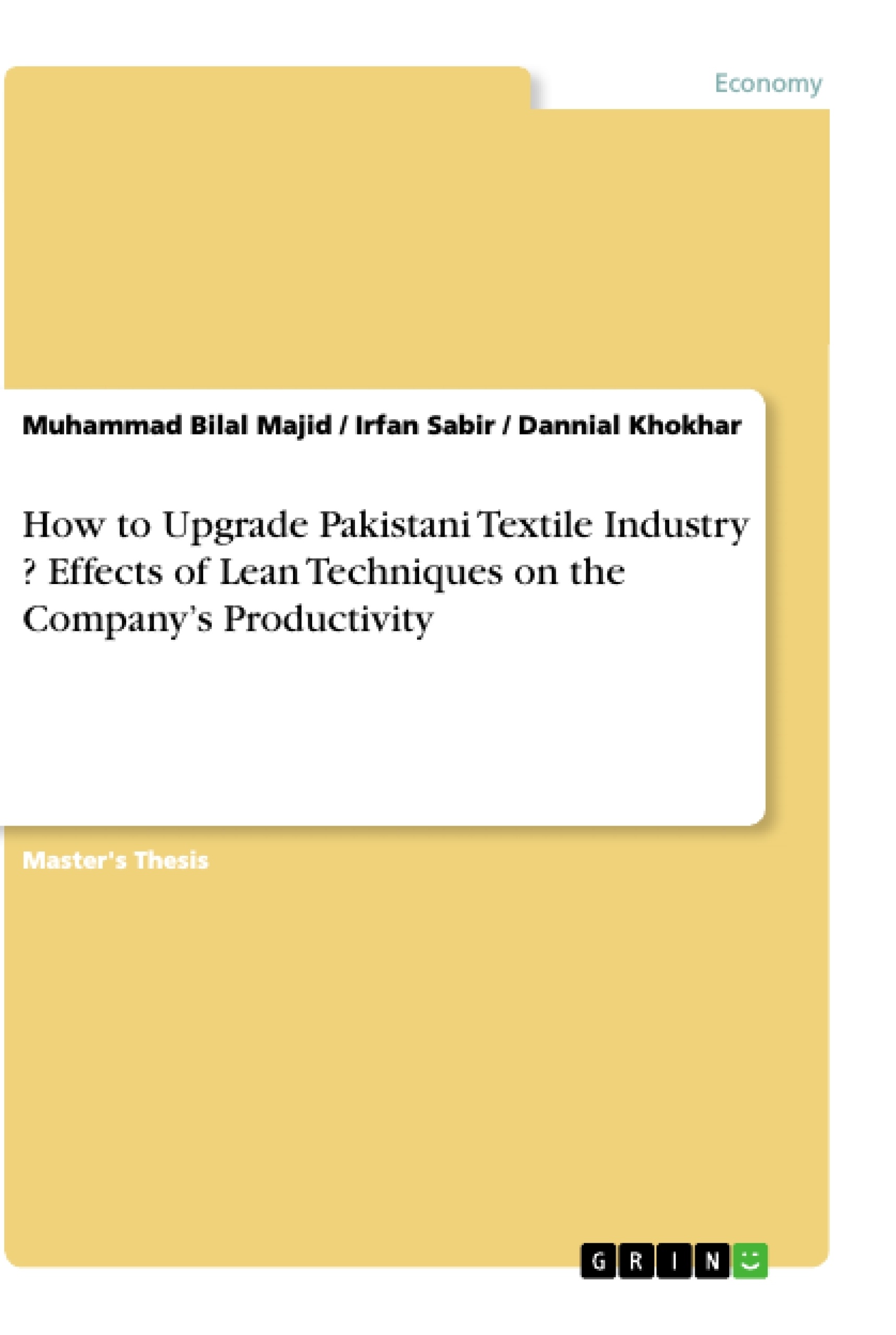In this thesis different apparel industries are overseen using interviews, secondary data and observations, a survey is also conducted to gather general information and effectiveness of lean and its tools.
For the survival in the present race of industries it is very important to upgrade and calibrate the technology. Lean manufacturing concept is applied to Pakistan’s Textile trade. The determination of conducting this study is to check that how much lean is effective; it is a multidimensional approach only the major dimensions are discussed in this research like reducing waste and improving productivity in garment production. I Two lean tools are also implemented. Resultantly the data gathered concludes that lean approach is highly efficient, but still a long way to go on the road of lean. The conducted survey shows that there is a good awareness regarding the lean approach, management knows that lean manufacturing is very helpful but there are unable in implementation, there is a less implementation knowledge and training staff in the companies. Only two lean tools are implemented in this thesis and more tools can be implemented in the future.
Inhaltsverzeichnis (Table of Contents)
- ABSTRACT
- Chapter 1: INTRODUCTION
- 1.1. Introduction
- 1.2. Background Study
- 1.3. Introduction to Lean
- 1.4. Types of Wastes
- 1.5. Lean Principles and Tools
- 1.6. Problem Statement
- 1.7. Research Objectives
- 1.8. Research Questions
- 1.9. Significance of the Study
- 1.10. Hypotheses
- 1.11. Tools Implemented
- 1.11.1. Single Minute Exchange of Die (SMED)
- 1.11.2 5-S Methodology
- Chapter 2: Literature Review
- 2.1 Literature Review
- 2.2. Continuous Improvement
- 2.3 Cost Reduction
- 2.4 Reduction of Rework
- 2.5 Independent and dependent Variables relationship
- Chapter 3: Methodology
- 3.1. Theory of Constraints
- 3.2. Theoretical Framework
- 3.3. Productivity Enhancement through Theory of Constraints
- 3.4. Research Methodology
- 3.5 Research Philosophy
- 3.6. Research Nature
- 3.7. Research Approach
- 3.8. Type of Variables
- 3.9. Data Collection Process
- 3.10. Designing of Questionnaires
- 3.11. Sample Size
- Chapter 4: Data Analysis
- 4.1. Data Collected through Survey
- Chapter 5: Implementation of the Lean Tools
- 5.1. Implementation of Lean Tools
- 5.1.1. SMED
- 5.1.2. Internal/External Machine Change Plan
- 5.1.3. Total Non-Productive and Productive Time
- 5.1.4. Unit plan of the Production Output
- 5.2. 5-S Methodology
- 5.2.1 Following was the condition without 5S
- 5.2.2. Methods adopted for Implementation
- 5.2.3. After Implementation
- Chapter 6: Results, Discussion and Data analysis using SPSS
- 6.1. Results and Discussions
- 6.2. Statistical Findings
- 6.3 Discussion and Crux
- References
Zielsetzung und Themenschwerpunkte (Objectives and Key Themes)
This study investigates the impact of implementing lean manufacturing techniques, specifically the Single Minute Exchange of Die (SMED) and 5S methodology, on productivity in the Pakistan textile industry. The research aims to assess the effectiveness of these lean tools in reducing waste and improving efficiency in garment production.
- Effectiveness of lean manufacturing in the textile industry
- Impact of lean tools on productivity and waste reduction
- Implementation challenges and success factors of lean methodologies
- Analysis of data collected through surveys and observations
- Contribution of the study to understanding lean implementation in developing countries
Zusammenfassung der Kapitel (Chapter Summaries)
Chapter 1 provides an introduction to the research, including the background, rationale, and problem statement. It defines lean manufacturing, its principles, and tools, and outlines the research objectives, questions, and hypotheses. Chapter 2 presents a review of relevant literature on continuous improvement, cost reduction, waste reduction, and the relationship between independent and dependent variables in the context of lean manufacturing. Chapter 3 describes the research methodology, including the theoretical framework, data collection methods, and analysis techniques. Chapter 4 analyzes data collected through surveys and observations, and Chapter 5 focuses on the implementation of the chosen lean tools, SMED and 5S, with detailed descriptions of their application and results. Chapter 6 presents the results and discussion of the study, including statistical findings and a critical analysis of the data.
Schlüsselwörter (Keywords)
The research focuses on lean manufacturing, its application in the apparel industry, waste elimination, and productivity enhancement. Key topics include the impact of lean tools like SMED and 5S, lead time reduction, and the importance of continuous improvement. The study investigates the effectiveness of lean methodologies in a developing country context.
Frequently Asked Questions
What is Lean Manufacturing?
Lean manufacturing is a multidimensional approach focused on eliminating waste, reducing lead times, and improving overall productivity in industrial processes.
What are SMED and 5S?
SMED (Single Minute Exchange of Die) is a tool for reducing machine changeover time. 5S is a methodology for workplace organization (Sort, Set in order, Shine, Standardize, Sustain).
How effective is Lean in the Pakistani textile industry?
The study concludes that Lean is highly efficient for reducing waste and increasing output, though many companies still face challenges in full implementation.
What are the main barriers to implementing Lean?
Major barriers include a lack of implementation knowledge, insufficient training staff, and management's difficulty in moving from awareness to actual practice.
What types of waste are reduced by Lean?
Lean focuses on reducing various types of "Muda" (waste), such as overproduction, waiting time, defects (rework), and unnecessary motion in the production line.
- Arbeit zitieren
- Muhammad Bilal Majid (Autor:in), Dr. Irfan Sabir (Autor:in), Dannial Khokhar (Autor:in), 2020, How to Upgrade Pakistani Textile Industry ? Effects of Lean Techniques on the Company’s Productivity, München, GRIN Verlag, https://www.grin.com/document/922226



